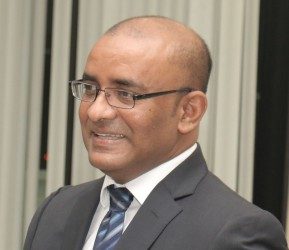Opposition Leader Bharrat Jagdeo yesterday said he would propose to President David Granger that they jointly approach the Caribbean Court of Justice (CCJ) to interpret the constitutional requirements for the appointment of a Guyana Elections Commission (Gecom) chairperson.
At a press conference yesterday, Jagdeo also said he is still awaiting word from the Ministry of Presidency on an urgent meeting he has requested with the president to resolve their differences on the issue.
Following Granger’s rejection of his list of six nominees, Jagdeo wrote the president on Tuesday requesting clarity on his interpretation of the criteria for the office holder and proposed an urgent meeting.

Granger on Wednesday said that Jagdeo will be given the clarifications, while sources indicated that there would not be a meeting. He also emphasised that regardless of what obtained in the past, now that the responsibility has been vested in him as President of Guyana, the provisions of the Constitution will be followed.
Article 161 (2) of the Constitution states, “Subject to the provisions of paragraph (4), the Chairman of the Elections Commission shall be a person who holds or who has held office as a judge of a court having unlimited jurisdiction in civil and criminal matters in some part of the Commonwealth or a court having jurisdiction in appeals from any such court or who is qualified to be appointed as any such judge, or any other fit and proper person, to be appointed by the President from a list of six persons, not unacceptable to the President, submitted by the Leader of the Opposition after meaningful consultation with the non-governmental political parties represented in the National Assembly.”
While the president has highlighted the legal qualifications stipulated by the constitution, Jagdeo and the opposition PPP have noted that it also makes provision for other “fit and proper” candidates to be appointed.
Granger himself was nominated for the post under the same proviso by then Opposition Leader Desmond Hoyte, although he has since said that any breaches that may have occurred in the past must not be allowed to persist.
“My understanding is that at all material times a member of the legal profession or several members of the legal profession were on the list but my acceptance of the nomination …does not necessarily mean that I must accept the six names that were submitted… So the point is, even if the Constitution had been breached, or a nomination been made in breach of the Constitution, 10 or 20 years ago, there is no need to repeat it… That’s not a precedent. I am accepting now as President that the Constitutional provisions must be applied,” Granger posited on Wednesday.
Jagdeo yesterday argued that even a layman would understand the intent of the drafters of the constitutional provision. “The intent was to broaden categories from which people can be appointed,” he said
Jagdeo said the constitution is clear to him and that the president has acknowledged that it is also clear to him.
He said too that the article was understood in the same manner by several of the originators of lists, particularly Hoyte, who, in his capacity as Opposition Leader, submitted lists for Gecom chairs in 1994, 1997, 2001 and 2002.
He pointed out that “these persons were not judges or did not have the qualifications to be judges.”
The names that were selected from the lists were: Edward Hopkinson, Doodnauth Singh who had the requisite qualifications, Brigadier Joe Singh (Rtd) and Dr Steve Surujbally.
He said it would be a “huge embarrassment” to Hoyte, himself a Senior Counsel, that he “did not understand the particular provision of the constitution. And now the president, with all due respect, a good historian, better understands this provision of the constitution than Mr. Hoyte…!”
Jagdeo said that he submitted his list with that interpretation of the constitution but the letter from the president stated that “the names do not seem to conform to Article 161 (2)….”
As a result, he wrote seeking clarity on whether the president is going with the old constitution or if there any other reason for him to reject his list of six nominees, who, according to him, are “eminently qualified.”
Jagdeo said he is prepared to meet with the president as early as possible and that “If after pointing these arguments out to him he still held on to his original view,” they may very well have to go to challenge the president’s interpretation.
“We need someone who is impartial, can withstand pressure from one side or the other to act in an unprofessional manner. I think that the current names that I have submitted all bear that hallmark,” he said, while adding that he is still open to meeting with the president.








